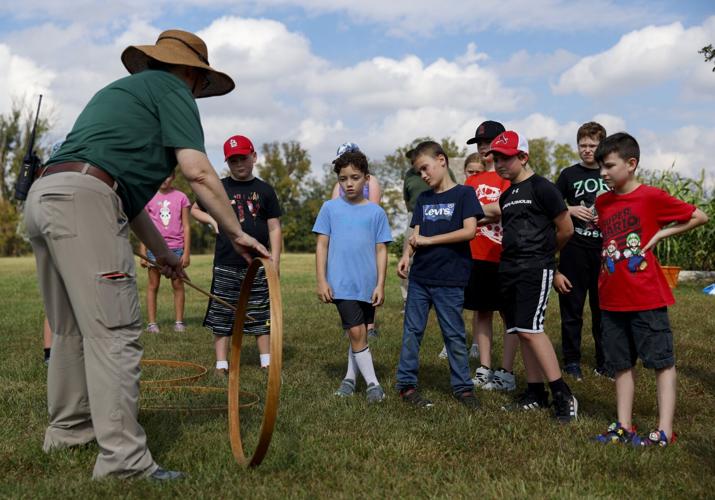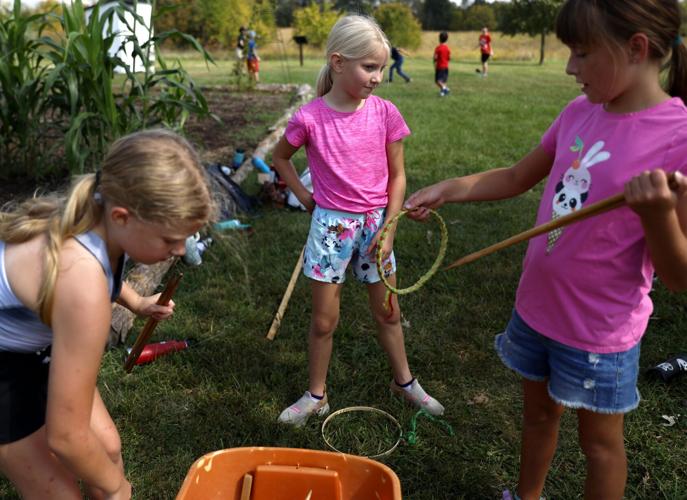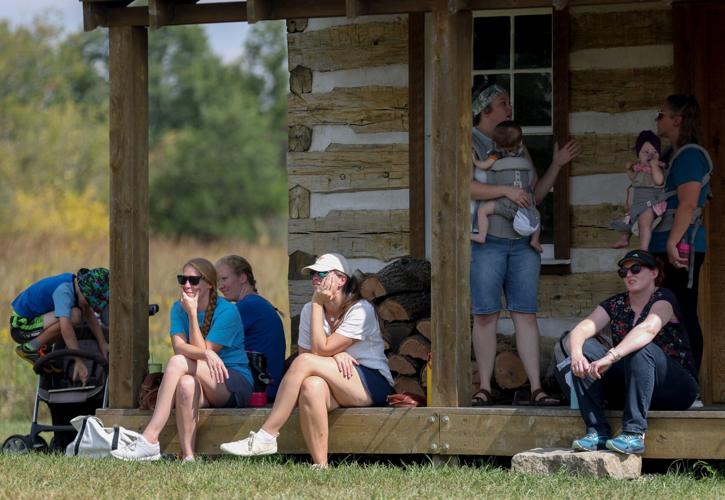
Park ranger Angel Ray teaches kids how to play hoop and stick during the Homeschool Skillbuilder program held by the St. Charles County Parks Department on Wednesday, Sept. 27, 2023, in Towne Park. Kids in attendance learned to play a variety of games, including battledore and shuttlecock, townball and graces.
WENTZVILLE — The kids playing old-fashioned games in Towne Park in the middle of the day weren’t on a school field trip, or even connected to a school at all. The outdoor scene showcased the modern-day home school, where learning happens anywhere but the kitchen table.
For the first time, St. Charles County Parks and Recreation offers a curriculum specifically tailored to home-schooling families. The classes called “Homeschool Skillbuilder” this fall include soup making, pumpkin carving, hiking and the 1880s frontier games held at various parks and historical sites.
“Home-schooling has so many facets and so much of it doesn’t have to be at home,” said Angel Ray, a St. Charles County park ranger. “It’s leaning into the things your child excels at and holds their attention.”
Home-schooling has gone mainstream since the start of the pandemic, when nearly all parents got a taste of the practice after schools switched to virtual learning. While churches have long hosted home-school programming, now parks departments, universities and local businesses are openly marketing to home-schooling families.
People are also reading…

Caroline Westover, center, 8, watches as Greer Smith, left, 9, and Charlotte Budge, right, 10, pick out pieces to play graces during the Homeschool Skillbuilder program held by the St. Charles County Parks Department on Wednesday, Sept. 27, 2023, in Towne Park. Kids in attendance learned to play a variety of games, including battledore and shuttlecock, townball and hoop and stick. Photo by Christine Tannous, ctannous@post-dispatch.com
�����Ӱ�ԭ�� County Parks and Recreation offers a home-school ice skating and crafts class from 1 p.m. to 3 p.m. on several weekdays at Queeny Park this fall. At Maryville University, home-schooled students can take six-week classes in robotics, Lego and animation in their interactive STEM studio. Trampoline parks offer special rates on weekdays to home-schooling families. The PTO from Bernard Middle School in the Mehlville School District opened their book fair Wednesday night exclusively to home-schoolers.
The stereotype of home-schooling as only for the anti-social or ultra-religious has faded since the park ranger home-schooled her own kids, now in their 20s.
“Now it’s far more acceptable. It’s something that people take pride in and realize they can give a lot to their kids,” Ray said.
With the resources available to parents both online and in-person, home-schooling curriculum and schedules can be tailored to the family’s schedule, said Sara Vestal of Warrenton, who taught public school for 20 years and is now home-schooling her 13-year-old daughter.
“We were looking for more hands-on quality in a different environment,” Vestal said. “Coming from private school, it’s less expensive and better quality.”
Home-schooling on the rise
Under Missouri law, home-schooling families do not have to register with the government, so it is difficult to determine accurate counts. However, the number of students transferring out of public schools to home school this year returned to normal after a hefty spike in 2020-2021. On average, fewer than 2% of Missouri’s public school students leave to home-school each year, according to the state education department.
But the state data doesn’t account for students who have always been home-schooled, or those who switched from private schools. A broader look at census data appears to show that Missouri’s home-schooling rate is growing faster than the national average.
Since April 2020, the U.S. Census Bureau has conducted an experimental “Household Pulse Survey” to study the effects of the pandemic on households at the national and state levels. Using data from the survey, a spike in the rate of home-schooling nationally among households with school-aged children between the spring and fall of 2020, the first year of the pandemic.
The Post-Dispatch also the survey data, looking at points in each of the last four school years. Researchers caution, though, that percentages derived from surveys should be considered approximations, and that there’s a higher margin of error for state-level data.
Of the U.S. households with kids in any type of school this year, 89% reported they had at least one attending public, just over 10% had any attending private, and close to 6% had home-schoolers, according to data collected from Sept. 20 through Oct. 2. Because households can have children enrolled in more than one type of school, the percentages add up to more than 100%.
In Missouri, meanwhile, households with home-schoolers made up a bigger share than nationally, nearly 10%. Households with public school enrollment, at 84.6%, and private, at 8.7%, were both lower than the U.S. rates.
The survey asked respondents to count the number of children in the household attending each type of school. Looking at those student counts, the national percentages of students in home school have held fairly steady over the last three years. But Missouri appears to have a steady increase in the share of home-schooling students, from 5.6% in 2020-2021 to 7.7% in 2023-2024.
The survey data also makes it possible to look at the demographic characteristics of the adult survey respondents in each household with kids in school. Comparing race by type of schooling nationally, the Post-Dispatch found that respondents in home-schooling households skewed more white, 78.1%, less Black, 10.5%, and less Asian, 2%, than the other types of schooling.
Minimal oversight of home schools
The reasons for home-schooling are varied, ranging from struggles with learning disabilities to concerns about school safety, bullying or ideological differences with curriculum involving diversity, equity and social-emotional learning.
Critics of home-schooling have concerns about the lack of academic standards or safeguards against abuse. There is no agency tracking the outcomes of home-schooled students. And with hundreds of thousands of students unaccounted for nationwide since the start of the pandemic, educators fear that an unknown percentage are not receiving any form of education.
Home-schooling advocates say parents have a fundamental right to direct their child’s education without government interference. The group , founded in Maryville in 1983, lobbied against the state’s MOScholars tax-credit voucher program because it requires standardized testing and background checks for home schools. The $6,375 vouchers for tuition or educational resources are open to home schools, but only nine students took advantage last year in Missouri.

Chase Beam, 9, reacts as he plays hoop and stick during the Homeschool Skillbuilder program held by the St. Charles County Parks Department on Wednesday, Sept. 27, 2023, in Towne Park.
The recent wave of home-schooling parents are less motivated by religious reasons and are evenly divided between Democrats and Republicans, according to . They are also less averse to public schooling in theory, with 70% of parents saying they haven’t ruled out a return to a neighborhood school in the future. And a growing number of families are splitting the kids up among public, private and home schools based on their needs.
Rhiannon Parisi of Wright City said her 14-year-old son switched to home-schooling from a small Christian school for the freedom to explore new interests, like learning Japanese.
The benefits of home-schooling, Parisi said, also include “being able to have more autonomy in your child’s education, what you consider safe and just what you want for them, and not having to trust somebody else is doing it.”

Parents watch as their children play a game of townball during the Homeschool Skillbuilder program held by the St. Charles County Parks Department on Wednesday, Sept. 27, 2023, in Towne Park.
Photographs from �����Ӱ�ԭ�� Post-Dispatch staff and freelancers for the week beginning Oct. 8, 2023. Video by Beth O'Malley

